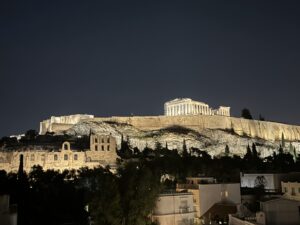The first week of our Study Abroad Trip in Athens has brought me incredible learning, exploration, and fun! We have had the opportunity to visit places where the founders of modern logic, philosophy, religions, and democracy were when they first developed these ideas. We have visited the Acropolis, where the Parthenon, Temple of Athena Nike, Theater of Dionysus, Erechtheion, and other structures are located, along with places such as the Panaethenic Stadium, Temple of Zeus, Temple of Hephaestus, the Ancient Agora, the Lyceum and much more.
The lessons from Greece that have stuck out to me the most have come from the Big Three philosophers. These are Socrates, Plato, and Aristotle. Socrates developed the Socratic method, which is a line of questioning used to break down the ideas of others and force people to think about why they think what they think or believe what they believe. This questioning mindset opened the door to modern philosophy and provided a method of teaching that can still be used today. Socrates’ mentee Plato followed in his footsteps and helped preserve and expand on Socrates’ ideas by recording them in his writings. The most profound thing I learned from Plato is his idea of having a soul separate from the physical body. He developed a belief that although his physical body would undoubtedly die, his soul must live on in some way. This idea is the backbone of many prominent modern religions, such as Christianity and Islam. Finally, Aristotle came onto the scene as a student of Plato. Aristotle created thousands of scrolls detailing his learnings and ideas. He wrote about everything from living organisms’ classifications to logical reasoning methodologies. However, the most exciting idea to me was regarding the Golden Mean. The Golden Mean is the idea of finding the balance between two extremes. Aristotle taught that the key to a virtuous life was finding a balance between extremes.
There was one bit of history I learned in Athens that did surprise me. When discussing Alexander the Great and his conquest, the style in which he ruled after conquering land was not what I expected. Instead of forcing the people of areas to conform to his beliefs or culture, he allowed them to continue practicing their own beliefs and culture. This made the transition to his rule easier for the people and helped create a more stable empire. This strategy was genius, and the understanding of culture as he did should still be strived for by businesses today.




